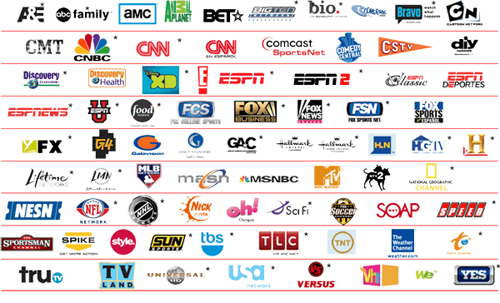Verizon has proposed that it only pay channel providers when viewers actually watch a show. It’s not clear what effect this would have on pricing for consumers, though TV industry skepticism means it may well only be a hypothetical debate.
At the moment, most US cable and satellite firms pay channel providers a fixed monthly fee for each subscriber who can receive a channel in their particular package. Verizon believes it’s getting stiffed on that system because it’s having to pay for channels even when few people are watching them.
Although Verizon hasn’t said this publicly, there’s an implication that some TV companies can benefit by forcing cable and satellite firms to pay for less popular channels in order to get access to the more popular channels without which they’d struggle to get subscribers.
Terry Denson, who is in charge of negotiating to bring channels to Verizon, says he’s already started talking with some TV firms about a tweak to the system. It would mean the fees wouldn’t be based on the number of subscribers with access to each channel, but rather than number who watched the channel for at least five minutes during the month. This would be worked out by the actual data recorded on Verizon set-top boxes, rather than the Nielsen ratings that extrapolate from a sample.
Denson is uncertain about how this would affect the costs to consumers. He says it wouldn’t mean price cuts, but would be unlikely to mean major hikes unless the number of people watching smaller channels was higher than expected.
The Wall Street Journal notes that there’s often a significant difference between how much cable firms pay for channels and how many viewers they get. The biggest example is sports channels, which on the face of it appear to be overpriced given their number of viewers. That’s partly because sports channels have to pay high prices for programming (because the higher proportion of people watching live rather than on PVR delay makes the audience more valuable to advertisers) and partly because the channel owners know they need to make their money up front because there’s much less interest in rerun rights.
Denson suggests that he’ll likely propose the idea as and when carriage deals come due for renewal. The problem for Verizon is that it likely doesn’t have enough power to force every channel provider into accepting the pay-per-viewer model. That means TV companies will only accept the deal where they would financially benefit, for example if they have a particularly high proportion of channels with broad audience bases.
If the model did catch on, it’s likely it would be bad news for lovers of more obscure or cult shows. The pricing structure would mean it could become more valuable for a TV channel to attract a broad audience that watched only occasionally than to have a narrow but dedicated audience that watched regularly. You’d likely see more channels putting on shows designed to attract people outside of their usual audience base, such as SyFy showing pro wrestling, but with even less pressure to make sure those viewers stuck around and watched other shows on the channel.

